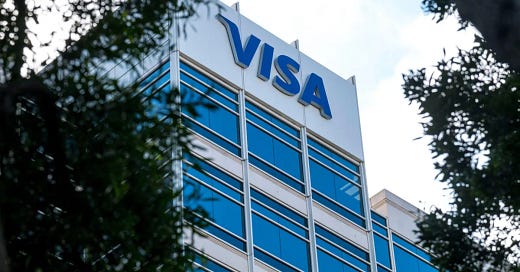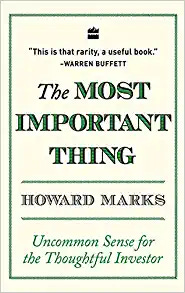Visa's Value, Phil Town's Wisdom, and the 'Most Important Thing' Unveiled!
"It takes 20 years to build a reputation and five minutes to ruin it. If you think about that, you'll do things differently."
In our expedition today, we're exploring the dynamic landscape of a corporation that has sparked our curiosity - Visa. We'll be imparting vital wisdom from the renowned Howard Marks, a luminary in the world of value investing, and gleaning knowledge from the expertise of Phil Town. Moreover, we'll be dissecting a fundamental book that every value investor should have on their bookshelf - "The Most Important Thing: Uncommon Sense for the Thoughtful Investor" by Howard Marks. We'll also be sharing actionable advice to elevate your investment journey. Buckle up for a ride filled with insights and enlightenment!
Book Review
"The Most Important Thing: Uncommon Sense for the Thoughtful Investor" by Howard Marks
Renowned investor Howard Marks has penned a truly insightful guide for value investors with "The Most Important Thing: Uncommon Sense for the Thoughtful Investor." The book demystifies the complex world of investing by focusing on key elements of a successful investment strategy.
Understanding Market Cycles: Marks emphasizes the importance of recognizing market trends and cycles. He argues that understanding and capitalizing on the cyclical nature of markets can provide an edge to investors.
Risk and Risk Management: One of the book's most notable points is the emphasis on understanding and managing risk. Instead of chasing returns, Marks urges investors to minimize the potential for loss.
'Second-Level' Thinking: Marks introduces the concept of 'second-level' thinking, a more detailed, complex, and nuanced form of analysis that gives investors a competitive edge over others who rely on first-level, simplistic predictions.
Patient Opportunism: Marks encourages investors to be patient and wait for opportunities where the odds are heavily in their favor. Such opportunities typically occur when the market is behaving irrationally.
Importance of Contrarianism: He underlines the need to sometimes go against the crowd to find value where others overlook it.
The clear, direct language and real-world examples make this book not only a vital read but also a practical guide for investors. The insights shared by Marks are based on his decades-long experience, making the advice and strategies grounded and actionable. With its emphasis on risk, patience, and critical thinking, "The Most Important Thing" is a valuable addition to a value investor's arsenal.
Company Breakdown
Ticker: Visa V
Price: $233
P/E Ratio: 27.09
Market Cap $476.73B
Summary:
Visa Inc. is a global payments technology company connecting consumers, businesses, financial institutions, and governments in over 200 countries and territories. Established in 1958, Visa is one of the most recognized brands in the world.
How Visa Makes Money
Visa operates one of the world's largest electronic payment networks, which it monetizes primarily through transaction fees. Here's a simplified explanation of their business model:
Transaction Processing Fees: Visa makes money every time a transaction is made using one of its cards. This fee is usually a small percentage of the total transaction and is paid by the merchant's bank (known as the acquiring bank).
Data Processing Fees: Visa also charges for the service of transferring, storing, and processing data. This includes the information required to complete, clear, and settle transactions.
International Transaction Fees: When a Visa card is used for a transaction in a foreign country, Visa charges an international transaction fee. This applies even if the transaction was conducted in the cardholder's home currency.
Other Services: Visa also earns income by providing value-added services such as fraud prevention, information services, and merchant and issuer solutions.
Interest and Fees from Visa Credit Cards: While Visa itself isn't a bank and doesn't issue cards or set the terms for cardholders, it does earn fees from the banks that issue its branded credit cards, especially when cardholders carry a balance or incur late fees.
It's important to note that Visa operates on a "four-party system," involving the cardholder, the card issuer (usually a bank), the merchant, and the merchant's bank. This expansive network is a crucial part of what makes Visa a global leader in digital payments.
The Opportunity
There are about 4,646 publicly listed companies in the U.S., with only a select few being "compounders" offering superior, long-term compounding investment returns. One such company is Visa (NYSE:V).
Compounders are characterized by an increasing demand for their shares coupled with a decreasing supply. This can be tracked through three variables: diluted shares outstanding (representing supply), and growing revenue and free cash flow (representing demand).
Compounders consistently increase their revenue and free cash flow while reducing their share count. This combination creates a wealth-building engine for investors.
Over the past five years, Visa has increased its revenue from $20 billion to $30 billion and its free cash flow from $11.2 billion to $18.1 billion. During the same period, it reduced its share count from 2.32 billion to 2.09 billion.
Now is a great time to invest in Visa because its current valuation presents a compelling entry point. The stock currently trades at a 26x multiple of free cash flow, significantly lower than its five-year average of ~33x.
Potential risks associated with investing in Visa include business execution, competition, macroeconomic factors, and technical sentiment. However, despite these risks, Visa's strong fundamentals make it an attractive investment option.
Investor Spotlight
Phil Town is an American investor, motivational speaker, and author, well-known for his value investing approach. After serving as a Green Beret in the Vietnam War, Town started working as a river guide. He began his investment journey after being introduced to the principles of value investing by one of his passengers. Despite his lack of formal education in finance, he successfully turned $1,000 into $1 million within five years.
Phil Town has since focused on teaching his investment strategies to others, advocating for a simplified version of Warren Buffett's value investing principles. He has written several popular books, including "Rule #1: The Simple Strategy for Successful Investing in Only 15 Minutes a Week" and "Payback Time: Making Big Money is the Best Revenge," both of which have topped The New York Times Best Seller list. He also hosts the "InvestED" podcast with his daughter, Danielle Town.
Investing Tips
One of Phil Town's prominent investing tips is the concept of "Rule #1 investing". Rule #1, named after Warren Buffett's first rule of investing, is "don't lose money." Town emphasizes the importance of investing with a margin of safety that allows for human error, bad luck, or extreme volatility in the market. He believes that investors should focus on buying companies that they understand and are confident in for the long-term, and should only buy these businesses when they are on sale to limit their downside risk and potential for loss.
Charlies New Warning!
We always value your thoughts, questions, and feedback. Your insights help us create content that best serves your needs and interests. Please don't hesitate to reach out to us with any comments, questions, or even topics you'd like to see covered in future editions of our newsletter.
We are committed to providing you with relevant and insightful content, and your input is invaluable in helping us achieve this goal. Remember, there's no such thing as a silly question, and your feedback is always appreciated.
If you know someone - be it a friend, family member, or colleague - who might benefit from our newsletter, we encourage you to share it with them. Our goal is to create a community of informed and engaged investors, and every new reader helps us to do just that.
Thank you for your ongoing support and involvement. Your engagement is what makes this community so unique and valuable!
Best regards,
Value Vultures







